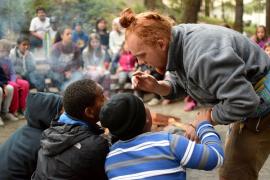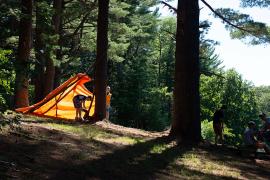"Not the kind of job our students want to pursue."
Have you received a similar response from a university career center rejecting your post on their job board?
While this message was disappointing and frustrating, the good news is most universities promote our jobs and an increasing number are encouraging their students to complete internships while working at camps.
We've had a lot of success at Camp Manitou providing our staff members the opportunity to complete an internship while working at our camp. A few of them were fortunate enough to use the experience to earn the credits needed for graduation.
Gavin Parker, a recent graduate of the Parks and Recreation program at Appalachian State, attended his school's Outdoor Interests Career Fair and met me on a video call. His degree program also required him to complete a culminating internship experience. An aspiring basketball coach, Gavin thought a summer at Manitou would continue his desire to improve his leadership, communication, and problem-solving skills. We spoke a few times, and I agreed to hire him as a counselor and intern.
Hunter Kossover, a recent graduate of the Parks and Recreation program at East Carolina University, came to our camp after his third year at ECU. He had a successful and positive experience, and rehiring him for his second summer was a high priority for my team. His East Carolina program required him to complete an internship to earn his degree, and I worked with him to develop a plan to satisfy the requirement.
As recent graduates, Gavin and Hunter shared takeaways from their experience completing internships at camp:
Skill Development
-
Gavin says he values the time he spent at camp planning his training sessions because it helped him better prepare his current players for their games. He also notes how camp exposed him to a wide age range of children. The exposure gave him a perspective on the different skill levels he would encounter in his next job, where he works with youths ages seven to 17.
-
Hunter is working for his local park and recreation agency. He says his supervisor praised his willingness to problem-solve and quickly pivot, and he also attributes his camp experience to elevating those skills. He says camp gave him the confidence to build new programs.
Communication
-
Being a camp counselor pushed Gavin to consider how he communicates with people. He felt more aware of his willingness to read the room in different situations. Gavin also recognizes how the experience developed his listening skills. "As someone who talks a lot and tends to be right in the middle of anything and everything, I was able to become a better listener whether it was from a kid, peer, or authority figure," Gavin said.
-
Hunter spent a lot of time before the summer writing curriculum, sharing this with his professor, and then pitching ideas to the Manitou leadership team. The preparation positioned him to launch his program and attract attention from the community. "During the summer," Hunter said," my public speaking skills increased because I found myself in situations where I had to speak in front of the entire camp staff and campers (multiple times), as well as speak to and instruct large groups of people."
Camp as an Internship Site
-
Gavin had no previous camp experience and traveled to an unfamiliar part of the country. "I was surprised at how fast it went by," Gavin said. "Yes, 10 weeks seems like a long time, and the days can seem very long, but the weeks fly by. One day can feel like it is never-ending, and you want some sleep, but the next thing you know, the week is over, and you are starting a whole new week." What started out being a gamble for him and for us turned into a win-win for both.
-
As a returning staff member, Hunter appreciated the camp community's buy-in to support his experience. "I was surprised how willing, helpful, and invested all the staff was in ensuring that I had everything I needed to complete all the requirements and assignments for my internship," Hunter said. "Alongside this, I had an incredible amount of fun doing my internship at camp, and I was able to meet so many great people who ended up becoming my best friends who I still keep in contact with today."
Who Should Do Their Internship at Camp?
-
Our interns agree that people need to love working with kids, being outdoors, and teaching recreational activities. Gavin adds, "They should be hardworking and driven and not afraid to figure things out and adapt on the fly."
-
Hunter emphasizes the social aspect of camp and people's willingness to meet new people. "They should be into challenging themselves, being entertained, and being role models," he said. "And most importantly, they should want an internship that allows them to travel, get paid, and provides a free place to eat and stay."
Offering an internship program has brought us people who might not have considered working at camp otherwise. They developed new programming and made contributions beyond the "camp counselor" job description. We have also found interns to be amongst our most successful counselors, and after a successful experience, they help spread the word about the value of working at camp to others. As a camp, we also feel more aligned with universities and confident we are sending our counselors back as better students or confidently into the workforce.
This blog was written on behalf of Project Real Job whose purpose is to support camps in their efforts to recruit, hire, and retain staff.
Dave Schiff is co-owner and director of Camp Manitou in Oakland, Maine, where he’s spent the last 30+ summers. He is a member of the ACA, Staff Recruitment and Retention Committee, and he lives with his family in New York City. He can be reached at [email protected].
Photo courtesy of Wisconsin Lions Camp in Rosholt, WI
The views and opinions expressed by contributors are their own and do not necessarily reflect the views of the American Camp Association or ACA employees.




